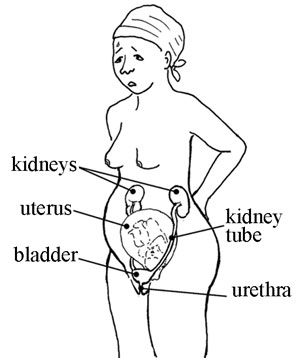Treatment of anaemia in pregnancy
If a woman has severe anaemia (a blood test shows she has haemoglobin less than 8 gm per litre of blood) in the 9th month of pregnancy, she should plan to have her baby in a hospital.
Moderate levels of anaemia can usually be cured by eating foods high in iron and folate, and also vitamin C (like citrus fruits and tomatoes), and by taking iron tablets and folate. The treatment dosage is:
- Iron: 300 to 325 mg (milligrams) of ferrous sulphate twice a day taken by mouth (double the dosage given to prevent anaemia).
- Folate: 400 µg (micrograms) of folic acid once a day by mouth (the same dosage as for prevention).
After prescribing these tablets and dietary advice, a pregnant woman with suspected anaemia should be checked again in 4 weeks. If she is not getting better, refer her to the health facility. She may have an illness, or she may just need a stronger iron supplement.
The supplements should be continued for 6 months during pregnancy if less than 40% of women in your community have anaemia. Continue for a further 3 months after the birth if more than 40% of women are anaemic, and your client is breastfeeding.
Side effects of iron tablets
Taking iron tablets can cause side-effects like constipation, nausea and black stools. Tell the woman she may have these side-effects, but it is important for her to keep taking the iron tablets. Taking the tablet when she eats a meal may help to prevent nausea, and drinking plenty of healthy fluids and eating lots of fruits and vegetables helps to prevent constipation. Reassure her that the black colour of her stools is not harmful and will go when it is safe for her to stop taking the iron tablets.
